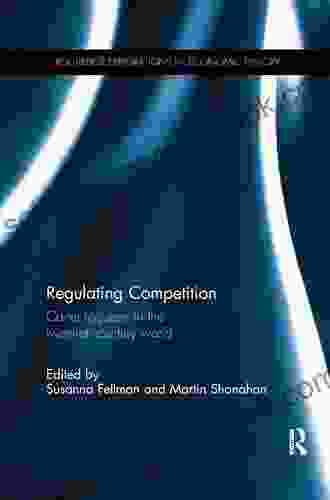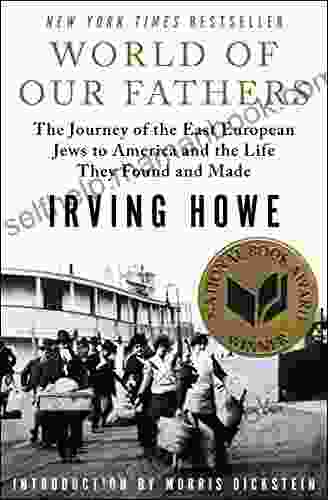Cartel Registers In The Twentieth Century World: Routledge Explorations In Economic History

Cartels have played a significant role in the economic history of the twentieth century. They have been formed in a wide range of industries, from steel and chemicals to pharmaceuticals and automobiles. Cartels have been used to control prices, output, and market share. They have also been used to stifle innovation and competition.
The study of cartels has a long history. However, it is only in recent years that scholars have begun to explore the role of cartels in the twentieth century world. This volume brings together leading scholars in economic history to examine the formation, operation, and impact of cartels in a wide range of industries and countries.
4.8 out of 5
| Language | : | English |
| File size | : | 2199 KB |
| Text-to-Speech | : | Enabled |
| Screen Reader | : | Supported |
| Enhanced typesetting | : | Enabled |
| Word Wise | : | Enabled |
| Print length | : | 330 pages |
The book is divided into three parts. The first part examines the causes of cartel formation. The second part examines the factors that determine the success or failure of cartels. The third part examines the impact of cartels on economic growth, innovation, and consumer welfare.
Causes of Cartel Formation
There are a number of factors that can lead to the formation of cartels. These factors include:
* High fixed costs: Industries with high fixed costs are more likely to form cartels because it is difficult for new firms to enter the market. * Low barriers to entry: Industries with low barriers to entry are more likely to form cartels because it is easy for new firms to enter the market and undercut the prices of existing firms. * Homogeneous products: Industries with homogeneous products are more likely to form cartels because it is difficult for consumers to differentiate between the products of different firms. * Government support: Governments may support the formation of cartels in order to protect domestic industries or to promote economic stability.
Factors Determining the Success or Failure of Cartels
Once a cartel has been formed, there are a number of factors that can determine its success or failure. These factors include:
* The number of firms in the cartel: The larger the number of firms in the cartel, the more difficult it is to reach agreement on prices, output, and market share. * The degree of product differentiation: The more differentiated the products of the firms in the cartel, the easier it is for firms to cheat on the cartel agreement. * The level of government enforcement: The more vigorously the government enforces antitrust laws, the less likely it is that cartels will be successful.
Impact of Cartels on Economic Growth, Innovation, and Consumer Welfare
The impact of cartels on economic growth, innovation, and consumer welfare is complex. Cartels can have both positive and negative effects.
On the positive side, cartels can lead to increased stability in prices and output. This can be beneficial for both consumers and producers. Cartels can also promote innovation by providing firms with the resources to invest in research and development.
On the negative side, cartels can lead to higher prices and lower output. This can harm consumers and producers alike. Cartels can also stifle innovation by preventing new firms from entering the market.
The overall impact of cartels on economic growth, innovation, and consumer welfare is difficult to assess. It is likely that the impact varies depending on the specific industry and country in which the cartel is operating.
Cartels have played a significant role in the economic history of the twentieth century. They have been formed in a wide range of industries and countries. Cartels have both positive and negative effects on economic growth, innovation, and consumer welfare. The overall impact of cartels is difficult to assess and likely varies depending on the specific industry and country in which the cartel is operating.
4.8 out of 5
| Language | : | English |
| File size | : | 2199 KB |
| Text-to-Speech | : | Enabled |
| Screen Reader | : | Supported |
| Enhanced typesetting | : | Enabled |
| Word Wise | : | Enabled |
| Print length | : | 330 pages |
Do you want to contribute by writing guest posts on this blog?
Please contact us and send us a resume of previous articles that you have written.
 Top Book
Top Book Novel
Novel Fiction
Fiction Nonfiction
Nonfiction Literature
Literature Paperback
Paperback Hardcover
Hardcover E-book
E-book Audiobook
Audiobook Bestseller
Bestseller Classic
Classic Mystery
Mystery Thriller
Thriller Romance
Romance Fantasy
Fantasy Science Fiction
Science Fiction Biography
Biography Memoir
Memoir Autobiography
Autobiography Poetry
Poetry Drama
Drama Historical Fiction
Historical Fiction Self-help
Self-help Young Adult
Young Adult Childrens Books
Childrens Books Graphic Novel
Graphic Novel Anthology
Anthology Series
Series Encyclopedia
Encyclopedia Reference
Reference Guidebook
Guidebook Textbook
Textbook Workbook
Workbook Journal
Journal Diary
Diary Manuscript
Manuscript Folio
Folio Pulp Fiction
Pulp Fiction Short Stories
Short Stories Fairy Tales
Fairy Tales Fables
Fables Mythology
Mythology Philosophy
Philosophy Religion
Religion Spirituality
Spirituality Essays
Essays Critique
Critique Commentary
Commentary Glossary
Glossary Bibliography
Bibliography Index
Index Table of Contents
Table of Contents Preface
Preface Introduction
Introduction Foreword
Foreword Afterword
Afterword Appendices
Appendices Annotations
Annotations Footnotes
Footnotes Epilogue
Epilogue Prologue
Prologue Rochelle Tobias
Rochelle Tobias Russell A Barkley
Russell A Barkley Fonda Lee
Fonda Lee Robert J Crane
Robert J Crane Isabel Thomas
Isabel Thomas Octave Mirbeau
Octave Mirbeau John R Bolton
John R Bolton Karen Anne Golden
Karen Anne Golden Gene Howell
Gene Howell Jules Mitchell
Jules Mitchell Frank Mccourt
Frank Mccourt Maurizio Braucci
Maurizio Braucci Anthony Horowitz
Anthony Horowitz Helen Ducal
Helen Ducal Lana Popovic
Lana Popovic Nekesa Ouma Namulu
Nekesa Ouma Namulu Maria Dahvana Headley
Maria Dahvana Headley Robyn Crane
Robyn Crane Shawn D Guiont
Shawn D Guiont Ardent Graham
Ardent Graham
Light bulbAdvertise smarter! Our strategic ad space ensures maximum exposure. Reserve your spot today!

 Ben HayesContract Endgame: An Unforgettable Thriller that Captivates from Beginning to...
Ben HayesContract Endgame: An Unforgettable Thriller that Captivates from Beginning to... Jeff FosterFollow ·3.8k
Jeff FosterFollow ·3.8k Casey BellFollow ·7.3k
Casey BellFollow ·7.3k Benjamin StoneFollow ·6.2k
Benjamin StoneFollow ·6.2k Philip BellFollow ·10.2k
Philip BellFollow ·10.2k Jacob HayesFollow ·14.5k
Jacob HayesFollow ·14.5k Roald DahlFollow ·8.5k
Roald DahlFollow ·8.5k Harvey HughesFollow ·11k
Harvey HughesFollow ·11k Jacques BellFollow ·10k
Jacques BellFollow ·10k

 Boris Pasternak
Boris PasternakThe Misted Mirror: Mindfulness for Schools and...
What is The Misted...

 Holden Bell
Holden BellEmbark on Thrilling Adventures in the Uncharted Depths of...
Unveiling the Enchanting...

 Seth Hayes
Seth HayesDelphi Complete Works of Lucan: Illustrated Delphi...
This meticulously edited...

 Jackson Hayes
Jackson HayesThe Enigmatic Cat Burglar: Unraveling the Intriguing...
In the annals of crime, the name Bernie...

 Quentin Powell
Quentin PowellAligned With The Cisa Review Manual 2024 To Help You...
The CISA Review Manual 2024 is the most...

 Austin Ford
Austin FordUnlocking Revenue Potential: A Comprehensive Business...
In today's digital...
4.8 out of 5
| Language | : | English |
| File size | : | 2199 KB |
| Text-to-Speech | : | Enabled |
| Screen Reader | : | Supported |
| Enhanced typesetting | : | Enabled |
| Word Wise | : | Enabled |
| Print length | : | 330 pages |










